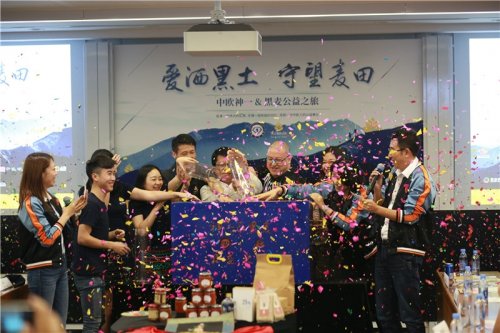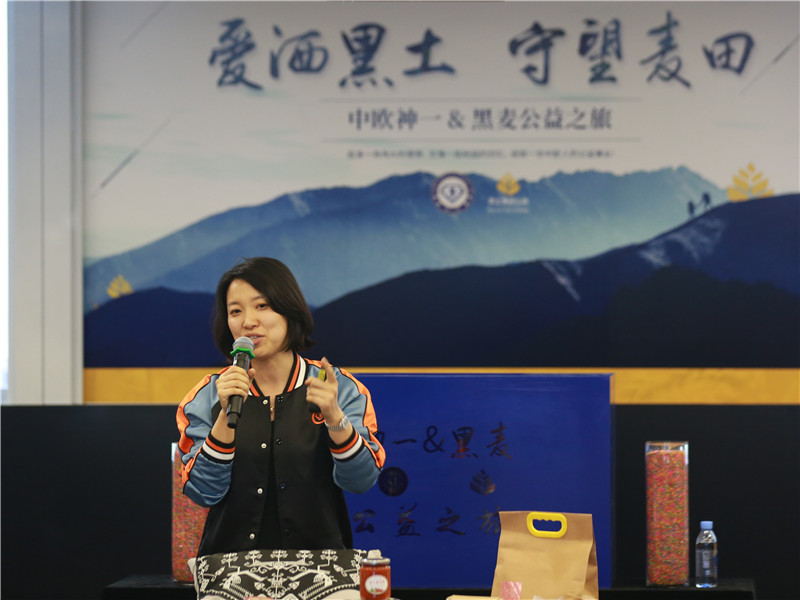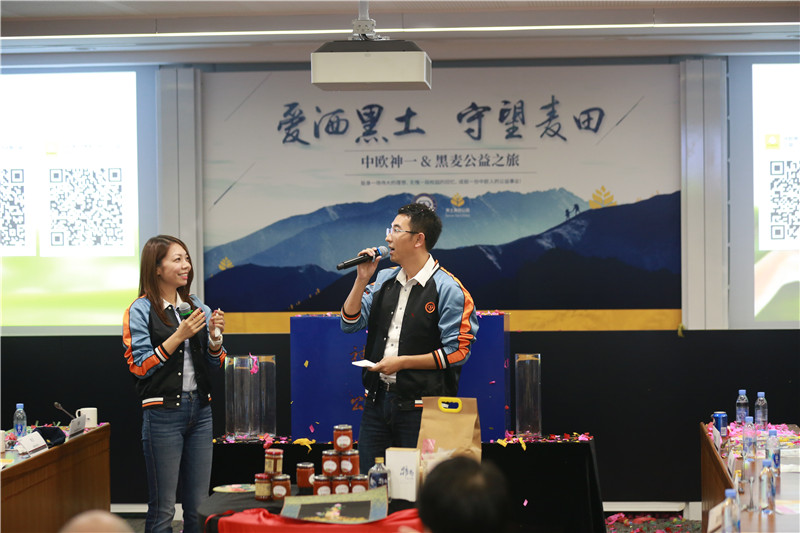More than the Pursuit of Success

By He Fanghong
At the end of 2017, a special roadshow was held at CEIBS Shenzhen Campus. Business leaders from various industries who attended the event could be seen listening attentively to the points being made. The roadshow was about a glorious ideal, a historic moment for the school and a tangible example of how the CEIBS community engages in public welfare.
Sustainable effort
At the beginning of 2017, CEIBS EMBA2016 Shenzhen Class One had the usual re-election of their class committee. The new team was expected to adhere to the class’ tenets: continue to build the class as an organisation characterised by a spirit of learning. At the same time, as traditionally done by second-term class committees, it should also shoulder one of the most important responsibilities: find a suitable public good project, which would forge a bond between class members long after graduation. This would need to be more than a one-off donation, something that could unite all the students and facilitate constant support and follow-up.
After several rounds of searching for the ideal project, the class’ Public Welfare Department found Serve for China. Initiated by Qin Yuefei, a Yale University graduate and village official, Serve for China is a targeted poverty alleviation project registered with China’s Ministry of Civil Affairs. Each year, the project selects and sponsors a batch of excellent Chinese youngsters to help alleviate poverty through industrial development and serve villages found in state-level poverty-stricken counties. By embracing the concept of teaching one to fish (instead of simply giving him a fish), the project plays a lead role in helping poverty-stricken households, rural youngsters, experienced farmers, etc to run professional farming cooperatives. Under the guidelines of state policies and with investment from government bodies tasked with poverty alleviation, it draws on and integrates social resources to develop initiatives in industries such as local planting, cultivation, agricultural product processing, handicraft, rural tourism, etc.
“As a public welfare platform, the entrepreneurs supported by Serve for China as they work towards poverty alleviation have led local villagers to start many projects. Can we pick one or two projects for students to invest in and follow up in the long run?” This was the question the class’ Public Welfare Department was trying to answer when it approached Serve for China. As a business school, CEIBS boasts a great number of excellent professors, entrepreneurially-focused students and alumni, and its graduates are among the social elite. The members of such a platform can complement their individual public service efforts with encouraging more professionals to join in. They can do so by taking advantage of CEIBS’ impact, supporting entrepreneurs on the platform who are engaged in excellent poverty-alleviating projects already underway, testing the “from 0 to 1”model, promoting it and fundamentally changing the poverty levels in remote rural areas.

Deep-dive into Hunan countryside
During the October 2017 National Holiday, the class’ Secretary General Gao Ke’ning, who is also Deputy General Manager of Shenzhen First Blue Chip Technology Co Ltd, visited Bucket Village, Huahuan County in Hunan Province. There he spent a memorable holiday with leader of the Miao embroidery project Yang Qi, who is also an entrepreneur with a passion for poverty alleviation
A UCLA graduate, Yang Qi joined Serve for China in 2016. A humble three-room structure used by Bucket Village’s Township Committee serves as both workplace and home for her and her colleagues. The Borderless Project, which she leads, has trained 100 female embroiderers through two terms of hand embroidery courses and 40 of them have already started to receive orders regularly. This brings in RMB1,000 a month for each embroiderer. However, with respect to overall project operation, as a fresh graduate, Yang Qi still lacks experience. As a result she has encountered many problems; for instance, shortage of funds and limited ability to explore the cultural implications of their products as well as product research and development. After days of in-depth communication, Gao Ke’ning came up with many feasible suggestions and helped put Yang Qi in touch with CEIBS Alumni Company Ellassay. This led to her cooperation on Miao embroidery with the renowned designer Vivienne Tam and the results are scheduled to be included in the Spring 2019 collection.
The visit also gave Gao Ke’ning a chance to learn about different poverty alleviation projects the entrepreneurs of Serve for China have initiated in various villages in Huahuan County: Miao embroidery, sour and spicy corn, countryside travel and corn liquor… Every project is a joint effort by a group of excellent colleagues at Serve for China, but each project also faces its own set of challenges.
Back in Shenzhen, Gao Ke’ning shared what he saw and heard throughout the visit with the leader of the Public Welfare Department Zhao Yi, who is also Vice President of Zhaoqing Futian Chemical Industry Co Ltd. Together they transformed the partnership with Serve for China from investing in a single project to comprehensive cooperation between the class and the platform: Serve for China recommended several representative projects and put on a roadshow in Shenzhen. Based on the needs of each project and their own experiences and resources, class members provided various levels of advice and support.
The class was convinced: teaching someone to fish is better than giving him fish. Therefore boosting poverty alleviation is the ultimate way forward when engaging in public welfare in China. The class and Serve for China entered into an official agreement and organised a roadshow called Shen One: Serve for China charity journey. Shen One is short for CEIBS EMBA2016 Shenzhen Class One.

“I’m willing to help”
Serve for China’s Tao Pinru was dispatched to the Molao Village, Biancheng Town, Huahuan County in Hunan Province. Tao is an entrepreneur, a maker, whose start-up specialises in sour and spicy corn. However, he encountered problems in running his business: factories were too remote, there was a lack of technology and shortage of expert teams, etc. He showed up at the roadshow, seeking more sponsorship for his project. He believed that with the knowledge obtained from CEIBS experts, his venture may be less risky.
At the roadshow Tao caught the eye of CEIBS EMBA2016 Shenzhen Class One member Qi Zhiping, who is Vice Chairman of the Board of Shenzhen Sinoagri E-commerce Co Ltd. Qi Zhiping personally invited his colleague who has responsibility for the B2C section to discuss distribution channels with Tao. This was an excellent way for the collaboration between CEIBS and Serve for China to fulfil one of its roles: providing experts as mentors for immature maker projects.
Help was also provided when Yang Qi’s Miao Embroidery Project faced the potential problem of transitioning from a charity to a business. When he learned of the issue, Liu Wen, Chairman of the Board of Xinjiang Yuanding Medical Apparatus and Instruments Company shared the company’s experience of working on a project in a village in Southern Xinjiang. “We donated a blanket factory to the village, and they gifted their first products to us,” he said. “If these products found their way into market, they would be overpriced. But viewed from the angle of a charitable initiative, although the blankets are not exquisite, they represent our dreams. I think Borderless should be a project about dreams. It would be unwise to run it as a business.”
There was also other valuable advice offered. For example, after receiving a handmade class logo made of Miao embroidery, Cui Peng, Chairman of Fapon Biotech Inc, suggested that Miao embroidery products could be a good gift option for companies to present to their clients.
There was also help from other sections of the CEIBS community. Qiao Xu, R&D Director of Beijing ZEHO Eco-Waterfront Treatment Planning Co Ltd, is a participant of CEIBS EMBA Beijing Class. As a designer with ten years’ experience, she has been in charge of projects related to water environment and tourism. She came across the roadshow while having elective classes in Shenzhen. After learning about the Hanglai Village tourism project that Chang Lan was working on, she immediately offered to help. Her participation fit in well with Zhao Yi’s original vision of encouraging more CEIBS EMBA classes – with Shen One at the core – to engage in public good activities.
“I cannot agree more that public good activities must be sustainable, but I have a different view about the theory that economic benefits are all that can make one happy; because sustainability relates to three aspects: industrial economy, social humanity and material space,” she said. “These three aspects must complement each other so as to push forward sustainable development.”
There was also help from Executive Director of Shenzhen Capol International & Associates Co Ltd Zou Zhanyu, an architect. Before the roadshow, he had an in-depth discussion with Chang Lan in which he expressed the view that architects face certain limitations when working on tourism-related projects: their thought process tends to be limited to the scope of their industry. He suggested that Chang Lan be more open during the planning process and pay more attention to issues pertaining to industrial integration.
CEIBS participants have become a think tank and rich resource for these less experienced makers with whom they share a wealth of practical experiences and business channels. They also research and develop more precise business models to reduce poverty in rural areas, which is of great use in improving makers’ chances of success.
Dreams + actions
“There is no model to copy when solving rural problems; if there were, the government would have already done it. As entrepreneurs, we should remain in cities to engage in mature business models and share our resources with Serve for China,” said Zhao Yi. Asked about the thinking behind the Public Welfare Department (PWD) he replied, “The first course CEIBS teaches EMBA participants is about social responsibility for entrepreneurs. The PWD is a response to CEIBS’ spirit of working for the public good.” As the first business school in mainland China to include business ethnics as a required course, the school set up the CEIBS EMBA Charity Prize in 2008 as a way to encourage EMBA participants to shoulder their social responsibility.
For Zhao Yi and the rest of the team, their big dreams are more than just empty words. “Our hometown and our people, this is the principle that guides the Public Welfare Department of CEIBS EMBA2016 Shenzhen Class One,” he explains. “Our ancestors are all labourers toiling on farms. This kind of public good is not the help that a successful man high above grants to the disadvantaged group, but speaks for our self-recognition and our journey back to our origins. We are helping our home town, our family.”











